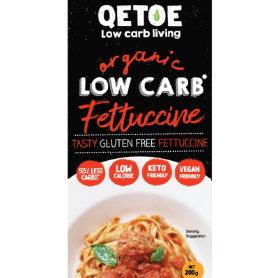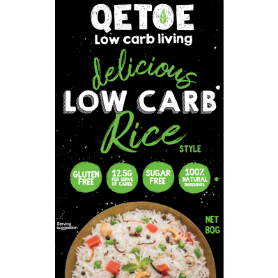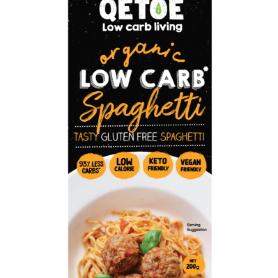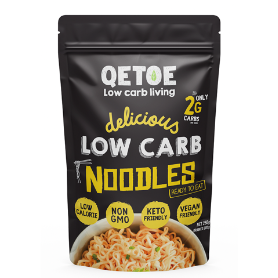The keto diet can have potential benefits that can increase fertility for both men and women. Here’s the low down on eating keto and how a low-carb lifestyle can help boost your fertility.
What Is the Keto Diet?
The keto diet is one of the most popular diets worldwide. Its low-carb, high-fat eating style has shown potential benefits for disease prevention and weight loss.
A traditional keto diet is very low in carbs, with just 5-10% of daily calories as a recommended intake. On the flip side, the fat and protein content is relatively high, with roughly 70% of total calories from fat and around 20% from protein.
Because of this, the body often switches from burning glucose as fuel to burning fat in a metabolic state called ketosis. When the keto diet is followed for a prolonged period, carb stores are insufficient for energy. When this occurs, ketone bodies are produced from fat and are used up as energy (1).
The keto diet is a tried and tested eating style that can work wonders for shedding the extra weight. But what about its impact on fertility?
How Your Diet Affects Fertility
Your diet can affect your energy levels and mood, but did you know that the way you eat can also affect how fertile you are? Here’s how.
Body Weight
Being overweight or obese can increase your risk of developing many chronic conditions, including cancer and diabetes. However, having excess weight or even being underweight can also affect your chance of properly conceiving (2).
Studies show that women who lost weight increased their chances of getting pregnant and that losing weight can even help menstrual cycles regulate (3). A typical example is seen in women with polycystic ovary syndrome (PCOS). PCOS is linked to obesity and is one of the most common reasons for infertility.
Obesity can also lower your chances of conceiving by preventing fertility treatments from working properly (4).
Hormones
Keeping hormone levels stable and having regular menstrual cycles are essential elements of fertility.
Your body weight can affect hormone production, as excess fat is associated with high levels of leptin hormones, disrupting the delicate balance of sex hormones (5). This results in irregular menstrual cycles and even impaired ovulation, both of which decrease your chance of conceiving.
Estrogen is a sex hormone that is made by ovaries. Fat cells can also make estrogen, and when weight is gained, fat cells grow and release excess estrogen. Too much estrogen production can prevent ovulation from occurring (6).
Ovulation
Ovulation occurs once every menstrual cycle when hormonal changes trigger an egg’s release from an ovary.
As mentioned above, disruptions in natural hormone levels and excess weight can cause irregular periods, causing ovulation to be delayed or even prevented. This can make it harder for you to track your period accurately and when ovulation occurs, which is common among women trying to conceive.
Keeping your period as regular as possible is vital to improving your fertility. Luckily, many studies have suggested a low-carb eating style, like keto, is successful in helping regulate ovulation (7).
Benefits of the Keto Diet on Women’s Fertility
The keto diet eliminates sweet and starchy carbohydrates. These have been linked to increased inflammation in the body, affecting hormone levels (8). Low-carb eating is also seen to decrease the risk of developing PCOS, a common condition during child-bearing years that can reduce your chance of conceiving (9).
Alongside this, the fat-rich keto diet can also help promote fertility. Researchers have linked increased consumption of polyunsaturated and monounsaturated fats like those found in avocados, fatty fish, and nuts to promote consistent ovulation (10). Healthy fats are not to be confused with saturated fats in processed foods, which can impair fertility.
The keto diet also eliminates sugary-processed foods, like soda, cakes, and cookies. All of these can change the balance of your gut bacteria, increasing inflammation. Studies show prolonged inflammation can lead to insulin resistance and is linked to many fertility-affecting conditions, including PCOS and endometriosis (11).
Benefits of the Keto Diet on Men’s Fertility
Diet can also affect the male’s fertility. In fact, in up to 50% of infertility cases, the issues lie with the health of the sperm (12). Obesity can affect the structure of sperm and reduce the sperm count, both of which can prevent successful conception from occurring.
The keto diet is well-acknowledged amongst many studies for its weight-loss benefits, especially in the short-term (13). Eliminating sweet treats and processed carbs can work wonders for shedding those extra kilos, and most individuals don’t even need to count calories in the process!
Also, omega-3s from fatty fish and antioxidants from leafy green veggies are considered fertility-boosting nutrients for men (14). Both of these can be found in a well-rounded keto diet.
Side Effects
While eliminating or minimising carbs can help lose the extra weight or keep insulin levels balanced, a balanced diet is still considered the gold standard for a healthy pregnancy (15).
Eating from all food groups is essential when trying to conceive or while pregnant, as this increases your chance of getting enough critical nutrients needed. These include folate and vitamins A, C, B6, and B12. Insufficient levels of these nutrients can prevent conception from occurring, so supplementation is recommended. Talk to your doctor if you have any additional concerns.
Some women also find carbs to be successful in easing pregnancy symptoms like nausea and fatigue. Cutting out all carbs can seem extreme for many women, so find a balance that suits your needs.
The Bottom Line
The low-carb, high-fat keto diet can help improve fertility for both men and women. Our diets can affect our weight, hormones, and inflammation levels, all of which can alter the ability to conceive.
A well-rounded keto diet has shown promise in conceiving and carrying a healthy baby.
Click the button below for more information on becoming an Ultra Lite + member and gaining access to our clean keto recipes and weekly meal plans.











